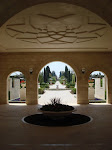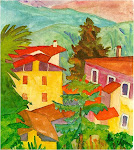The official history of the Baha'i Faith in Republic of Moldova starts in 1970-s when Mrs. Annemarie Kruger first visited the eastern Moldova (then the Moldavian Soviet Socialist Republic, a part of USSR). Even since the Ten Year Crusade one of the goals of the Baha'i World Community was "the opening to the Faith, circumstances permitting, of eleven republics comprised in the Soviet Union", one of them being Moldova. The believers of western countries always kept this in mind and prayed for time to come when circumstances permit.
One of them was a German citizen, Mrs. Kruger, who finally managed to come to Chisinau as a tourist. She was an interesting person herself: she is a granddaughter of Dr. Auguste Forel, a known Swiss entomologist, psychiatrist, philosopher of the beginning of the 20th century, who corresponded with Abdu'l-Baha and had embraced the Faith. She spoke German, French and English, therefore during her first visit to an "isolated republic" she looked for somebody who would know one of these languages and whom she could speak about the Faith to, which was quiet a task as she was always accompanied by a special person who would control all her contacts. Finally, one day she was very lucky to escape from this supervision, go to the park and meet a university teacher of French language there!
Annemarie Kruger visited Moldova three times and taught this lady and her husband. During Annemarie's third visit in 1984 (as far as I remember) he became the first Baha'i in Moldova. I saw his declaration card. He passed away in mid 90-s. Recently we talked to this lady, who also declared as Baha'i but was never coming to the community in my time. In spite of this her memories of Annemarie's visits were very warm and she said it was Annemarie's kind and generous personality that attracted her.
I could make sure of this myself during the last Annemarie's visit to Moldova for the first National Convention in 1996. At that time she was a pioneer in Bulgaria and was in a very advanced age. Nevertheless she came to see the fruits of the tree she, with the divine help, had planted in the Moldovan soil and to congratulate the friends with this historic event - the election of the National Spiritual Assembly. I remember her sweet smile, simple dress and white hair - absolutely white. In spite of being a heroine for the Moldovan community she was so humble. So kind and modest.
Now the Moldovan community is still growing, and still discovering some other connections of this land with the Baha'i Faith, even from earlier times. For example, it is known that in 1900s when this territory was Bessarabian province (gubernia) of the Russian Empire, a nobleman from Chisinau of Russian background Nikolai Zazulin was in correspondence with Isabella Grinevskaya, a poetess from St. Petersburg who had written a historical drama about the Bab.* In his letter he was suggesting her to continue her work and to write about Baha'u'llah Himself. The new drama was published in 1910. But we know nothing more about this gentleman and only a special research in the National Archives of Moldova may provide some information. The list of nobility of Bessarabian gubernia as of 1916 contains a similar name - Nikolai Matveevich Zozulin, which let us think that the result of such a research may be positive. It is interesting that in the same list one can find the name of the Baron Nikolai Konstantinovich Rozen, who may be a relative of the Baron V.R.Rozen, a Russian orientalist who was interested in the Faith. He was the one who had first translated the Lawh-i-Bisharat into Russian and had published a compilation of Baha'u'llah's writings in 1908.* It is very much possible that being from the same society Mr. Zozulin and (Bessarabian) Baron Rozen had been well acquainted and were both interested in the Faith. We can imagine that they were not only 2 of them.
Their further destiny is questionable. The life of Bessarabian society changed drastically after the beginning of the World War I and the Russian revolution in February 1917. The wave of independence and the raise of national aspirations led to unification of eastern Moldova (then Moldovan Democratic Republic) and the Kingdom of Romania in 1918, which existed as one country till 1940. This was exactly the period when the Romanian Queen Marie and her daughter Ileana became sincere and remarkable supporters of the Faith. Of course, the information about any other connections of eastern Moldova with the Baha'is in that period is still to be discovered, but the fact is that the first royal figure to become a Baha'i was not only the Romanian but also the Moldovan Queen.
The early history of the Faith in every land is mostly a history of individuals who through their thirst for truth, devotion, perseverance and sacrifice strove to reflect to the world the Light of Baha'u'llah. Their nationality is not important, but the details of their lives, the circumstances that surrounded them let us understand and appreciate better the power of spiritual motivation, the power of love in their hearts.
вторник, 29 июля 2008 г.
Подписаться на:
Комментарии к сообщению (Atom)




Комментариев нет:
Отправить комментарий